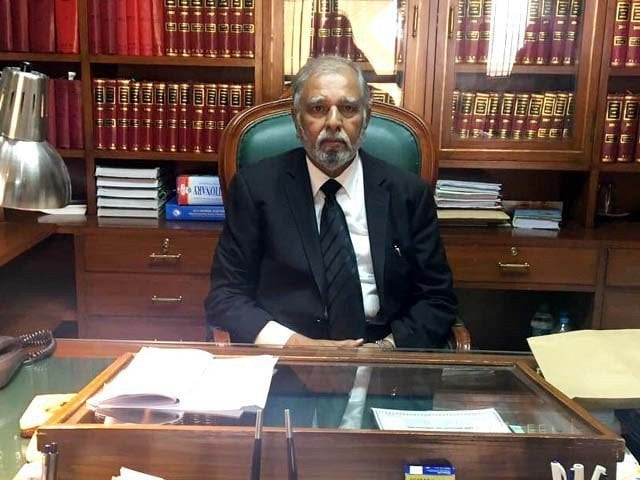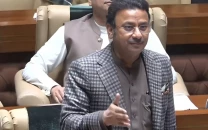One-man army: In final adieu, Justice (R) Muslim compiles a to-do list for Sindh govt
Recommends Commission’s orders be deemed as rulings of the Supreme Court

Justice (retd) Amir Hani Muslim. PHOTO: AMAR ABASSI
The report highlights the achievements and sets short, mid and long-term goals for the government whose track record on the water supply, drainage and environment fronts remains far from satisfactory.
As the report highlights, all the mega projects of water supply, sewage treatment, solid waste management, stopping pollution of waterways and protecting the environment are either at the nascent stage or the planning one. Over the course of Justice (Retd) Amir Hani Muslim’s stint as its chairman, since January, 2018, the commission received 750 applications or complaints, of which 450 were completely or ‘substantively’ sorted out.
Karachi
The commission has directed the Karachi Water and Sewerage Board (KWSB) to prepare a master plan to meet the existing and future requirement for the water supply and drainage. It also ordered the Sindh government to submit a phase-wise rehabilitation plan for the existing water distribution network within three months. Justice (R) Muslim recommended that the Pakistan Council of Research in Water Resources (PCRWR) should be assigned the task of monitoring water quality of the filtration plants as well as of the distribution network.
The commission has given June 30, 2019, as the deadline to the KWSB for the installation of flow meters at all water supply stations and a year for the installation across the board’s network. The board will also have to upload real-time water flow data for public information on its website from July 31, 2019. “Water losses consume a quarter of Karachi’s total water,” the commission underlined, emphasising the need to plug the losses and ensuring effective maintenance.
The commission set March 2019 as the deadline for completion of the 100 MGD Dhabeji pumping station, while giving three weeks to the board to make 18 reverse osmosis plants in Karachi operational. “The federal and provincial governments should resolve the issues pertaining to K-IV water supply project on priority.”
The project will provide an additional 250 million gallons per day water to the city from Kotri barrage through the K B Feeder canal. The board has been directed to adhere to deadlines for the completion of Treatment Plants (TP) I, III and IV while the Defence Housing Authority will have to operationalise the 2 MGD TP at Sea View beach. “The people of Karachi suffer unhealthy and unhygienic conditions at the beach due to disposal of sewerage from several phases of DHA.” The TP at the DHA has been given a deadline for April 2019 for completion. A 100-MGD TP V has been planned on Mai Kolachi Road and Karachi Port Trust will have to complete it in two years.
The Sindh Solid Waste Management Board (SSWMB) will have to establish six garbage transfer stations (GTS) equipped with up-to-date machines, equipment and tools. The scheme has been included in ADP 2018-19 and will be implemented by the board.
The development and upgrade of landfill sites at Jam Chakro and Gond Pass as per international standards will also have to be carried out. These projects have also been included in the next year’s provincial ADP. The SSWMB has been asked to develop waste to energy projects for which funds will be earmarked in next ADP.
The commission has suggested adding a tertiary sewage treatment system to enable the treated sewerage to be used by industrial consumers. It noted that the SITE industries at present are using up to 40 MGD of KWSB’s filtered water. “The potable water of the board can be saved for domestic uses.”
With the construction of trunk sewers about 29 kilometers in Lyari river and about 23 kms in Malir river, the flow of sewage in the rivers will stop as the S III sewage treatment project becomes functional.
To prevent the rivers from encroachment and solid waste dumping, the commission proposed that trees should be planted and theme parks developed which will also help protect the environment. “Every storm drain has been converted into a sewer,” Justice (R) Muslim observed.
Environment
The commission observed that the Sindh Environment Protection Agency (SEPA) needs a complete overhaul of its physical, technical and academic capacity.
It recommended that a climate change cell, research and development wing and law enforcement cell should be established in SEPA, as also proposed by its director-general. The commission also asked the government to set up environmental laboratories which will conduct research as well. It tasked the agency to finalise the survey of all industrial units in the province by June 2019 and ensure that the industries which have submitted undertakings for construction of in-house effluent treatment systems abide by their commitment.
The commission suggested the inclusion of environment as a subject in the educational curriculum and conducting regular studies on urban air quality. It stressed that EPA’s offices should be established in all districts.
Legal recommendations
“All the orders, directives and instructions passed or communicated by the water commission from January 14, 2018, to January 15, 2019, may be made a rule of the Supreme Court of Pakistan.” The government or private parties which submitted undertakings to the commission will face legal consequences if they failed to ensure compliance.
All the materials, records and proceedings of the commission will remain in the custody of the commission’s registrar at the Sindh High Court until the apex court decides the proper custodian. The provincial secretary, Tameezuddin Khero, is the only government official who finds a critical mention in the report, with the commission suggesting that this former secretary of PHED should not be posted in any department that deals with fundamental rights.
Rural Sindh
The commission credited itself for getting rehabilitated 1,465 out of 2,207 RO plants in the province. It directed the government to restore
the remaining by June 2019.
“Even the rehabilitation of all the water supply and drainage schemes might not resolve the problem for the reasons that there are several areas which still don’t have these facilities.”
The commission ordered the provincial government to undertake a survey to identify such areas. The PHED was supposed to install 237 new RO plants in Tharparkar through the Pak Oasis Company. But during the commission’s stint, only 34 could be set up.
“The provincial government should ensure that all the remaining RO plants are installed by the end of March this year,” the commission ordered, pointing out that its intervention sorted out the differences between the government and the Pak Oasis Company.
The commission observed that untreated municipal, industrial and other sewage is being dumped directly into the Indus River, its canals and distributaries. Initially, 180 such points in 15 districts have been taken up where the provincial government will set up treatment systems by the end of 2019.
On the subject of aquifers, Justice (R) Muslim stated that he could not find the reliable data and advised the provincial government to conduct a survey followed by regulation of consumption of sub-surface water.
The government has also been asked to install incinerators in all government hospitals in the province, provide filtered water in 4,000 government schools by June 2019, and the remaining schools by June 2020.
The sugar mills and distilleries which massively contribute to polluting the environment and waterways will have to be brought under stringent regulation. The commission proposed the government to explore the option of constructing small dams in Nangarparkar taluka of Tharparkar district. The SSWMB has been directed to make its offices functional in Hyderabad, Mirpurkhas, Nawabshah, Larkana and Sukkur divisions and to establish landfill sites in all districts in the province. The combined effluent treatment plants (CEPT) will be built in Nooriabad SITE by June 2019 and for Hyderabad and Sukkur by December 2019.
Hyderabad
The commission pointed out that all the water filtration plants in Hyderabad, which requires 75 MGD water per day, were nonfunctional before it ordered their rehabilitation.
After the rehab, 56 MGD water is being supplied to the city while construction of more filtration plants is required. During the commission’s stint, none of the four sewage treatment plants in Hyderabad could be made operational.
The commission directed the government to complete the rehabilitation of these defunct plants. “... the technical expertise of WASA [Water and Sanitation Agency] isn’t sufficient,” it noted, adding that the staff was not found capable of operating the filtration plants.



















COMMENTS
Comments are moderated and generally will be posted if they are on-topic and not abusive.
For more information, please see our Comments FAQ